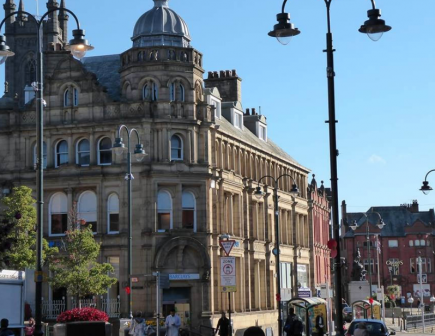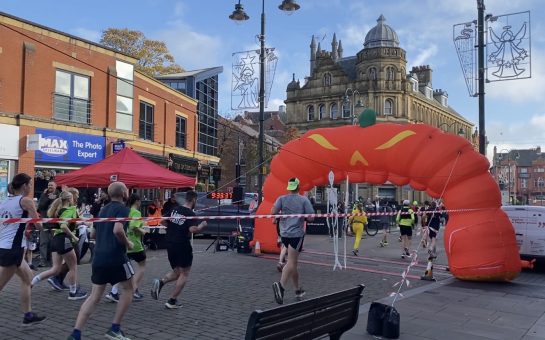In many ways Oldham is the quintessential Northern British Town.
Not a Victorian town with paper sellers, apple stalls, and factory workers, nor the children on bicycles, nuclear family, and patriotism of the 1950s.
Not even the long shadows on county grounds, invincible green suburbs, and old maids cycling to holy communion that John Major famously described.
With its dilapidated town hall converted into a brand-new Odeon cinema complex, town centre shopping precinct wrought in 1980s architecture and grandiose, moth-balled cotton mills, Oldham is instantly recognisable as a quintessential Northern British Town.
It is an eclectic mix of old and new, the past and present seeping into each other, creating a landscape that acts as a timeline of British history.
However, despite its traditional history, Oldham is currently the host to an innovative solution to something which is, sadly, also common in quintessential Northern British Towns, male suicide.
Andy’s Man Club was established by Luke Ambler in 2016 after his brother-in-law Andy committed suicide. It is a volunteer led organisation in which men suffering from mental health problems, including suicidal tendencies, can go for help.
WHAT A START TO THE YEAR!
Tonight at @andysmanclubuk first night of 2019 we had a record number of men through the door….
373 men attended tonight.
373 men took the step through the door.
373 men have taken that step to getting the help they need.
Blown away. No words.
— Luke Ambler (@lukeambleruk) January 7, 2019
Originating in Halifax the organisation has grown organically and now has 17 groups around the country. Ian, who coordinates the group meetings in Oldham, claims that they regularly host up to 60 men.
“It’s essentially a talking group, a peer-to-peer talking group.
“We have a series of questions that we have, we sit around in a circle, we pass a ball around and we all talk and help each other with our problems.
“We would generally find out where people are at on a weekly basis, what’s been going on from that previous week, things that are going on in their lives.
“Whether there are things people would like to get off their chest or whether there are particular issues they want to talk about.
“There are usually some targeted questions about trying to promote some kind of positive change and some kind of direction and setting targets and that kind of thing.”
It is a much-needed service. In 2017, the Office for National Statistics reported that of 5,821 suicides completed in the UK 75% were men and in the North West 15.6 out of every 100,000 male deaths is a suicide compared with 11.6 for London.
So, why is male suicide so much more prevalent in the North West?
‘FEMINISATION’ OF THE ECONOMY
A research paper by Samaritans entitled Men, Suicide and Society cites several studies that explain the high rate of male suicide in post-industrial towns, namely changes to the labour market, relationship break down, and particular characteristics of masculine socialisation.
Changes to the labour market and the industrial landscape of towns such as Oldham have been obvious and irreversible since the 1980s: between 1980 and 2010 the UK’s manufacturing sector shrunk by two thirds.
The decline in manufacturing work in areas such as Oldham has created a combination crisis where men are cut off from proving themselves in two ways: by providing for their families and by performing in a masculine occupation.
The so-called ‘feminisation’ of the economy – the growth of the service sector over manufacturing – has meant that there are fewer manufacturing jobs, limiting a traditional route to masculinity in working class areas like Oldham where for centuries manhood has been proved through physical labour.
Working in a manual job is also essential for proving self-sufficiency and for providing for one’s family.
Despite the steady decline of the bread-winner model in the UK with the advancement of women’s equality there is still a heavy expectation for a man to be the primary earner in a household.
The report also suggests that men suffer more from relationship breakdowns in the long-term.
Men receive more emotional support in relationships than women and therefore struggle more when they end.
Men’s social roles are often less flexible and as a result they can suffer from deep feelings of shame and inadequacy following break ups and men are also more likely to be separated from their children and suffer housing instability and homelessness as a result of relationship breakdown.
These issues are compounded by the insipid characteristics of male socialisation.
‘CRISIS POINT’
As children, men are bombarded with messages to hide their feelings and therefore often struggle to communicate distressing emotions.
This inability to self-express can be internalised to the extent that by the time men realise that they are vulnerable it is too late.
Suicide rates are higher in areas of socio-economic disadvantage, but this is even more the case when populations are looked at on a more localised level, which indicates that there may be specific characteristics of local character that contribute to suicide rates.
Ian is candid about the causes of mental health issues and suicide amongst men in Oldham and Greater Manchester.
“I think it’s an old mill town, very much an industrial working-class town and the general pervading attitudes of men within the town probably makes them predisposed towards aspects of mental illness and suicide in particular.
“I think there’s a very macho attitude within the town as a whole, as a former industrial town, where a man is very much seen as being the bread-winner within the family and the patriarch.
WALK AND TALK
Quality turn out for our annual walk and talk from Sowerby Bridge to Hebden Bridge along the canal.
Great chance for people of all ages and sexes to come together and get fresh air and have good conversations #itsokaytotalk pic.twitter.com/EW5w5MPV8u
— #ANDYSMANCLUB (@andysmanclubuk) December 29, 2018
“I think over time as industry has changed, jobs have changed, I think a lot of people’s identity had struggled as a consequence of that.
“I think for me that would certainly seem to be that way as people are kind of pushed into different areas of employment and as [there has been] general change as well, I think men’s identity has struggled as a consequence of that.
“There’s a huge issue around relationship breakdown as well.
“It has a massive effect on the mental health of the people that we see.
“Relationship breakdown is a big issue that puts people at crisis point.”
Ian, a suicide survivor himself, understands why the group’s unique character can help with the specific set of problems men in places like Oldham face, aiding them in overcoming the psychological, and in some cases physical, isolation they face.
“I think that the fact that there is no barrier to attendance as long as you’re male and over the age of 18…we don’t take any details from people and we don’t report unless there’s these particular issues.
“I think also word of mouth, I think a number of people that we get who are friends or who are people who are familiar with a friend of the group is something that drives us.
“I can relate to men who based on my experience [relate] to me in a way that I couldn’t have done with women that I know.

OLD AND NEW: With male suicide on the rise in towns like Oldham, Andy’s Man Club has grown organically to an impressive 17 groups nationwide
“I can’t necessary put my finger on it but intuitively it just feels easier in that environment. There’s a real community feel about the club.
“I wouldn’t want to say that it’s exclusively macho way…but there is certainly a feel that men can be men as well as just being part of this group…in a natural and friendly way that doesn’t replicate itself in other aspects of life.”
TOGETHER IN VULNERABILITY
The club is diverse, containing members with disabilities, from a variety of ethnic groups, and of different sexual orientations, but all the members are united in their journey and learning from each other to get well.
“I think there’s a common denominator between us all.
“We’ve all walked through that door and we all have a level of vulnerability that kind of brings us together.
“We do rely on people who are at different aspects of the journey and this kind of process works because I think the man who walks through the door on that first evening wants to be around people who are in a similar situation.
“But I think he also wants to see that someone else is at a different point in their journey and is actually well and functioning and has taken a lot from a group of men, to be in a position to give back to the other members.”
The issues which cause high rates of suicide in men are, like the landscape of Oldham, a mixture of old and new, but the unique, organic character of Andy’s Man club is a perfect solution.
A place where men can be themselves but also be vulnerable, and a place to break the deadlock of male emotional distress built up throughout a lifetime.
A quintessentially localised solution to a quintessentially local problem.
Image courtesy of Twitter, with thanks.



